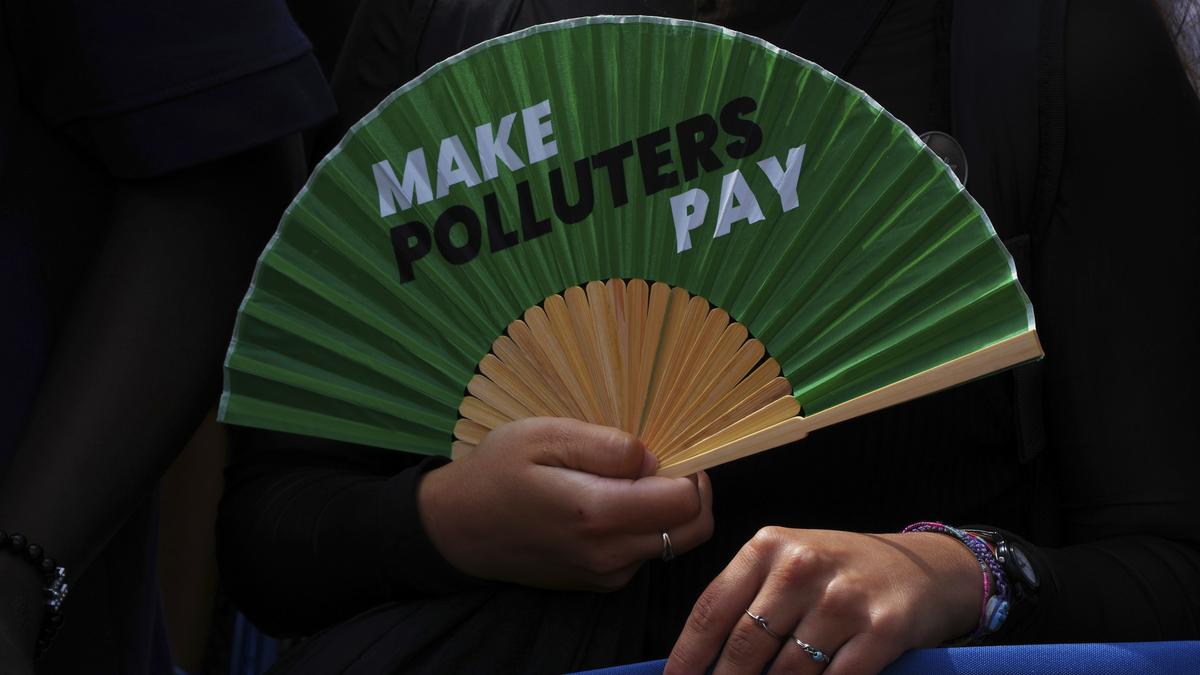



The International Court of Justice (ICJ) has issued an advisory opinion on states' obligations to address climate change, focusing on the Paris Agreement's 1.5°C temperature target. The ruling emphasizes the legal duty of states to prevent climate harm and the responsibility of developed nations to lead climate action.

Copyright infringement not intended
Picture Courtesy: THE HINDU
The International Court of Justice (ICJ) recently issued a landmark advisory opinion on the obligations of states concerning climate change.
|
International Court of Justice (ICJ)
|
The ICJ advisory opinion is the result of the effort of the government of Vanuatu, a Small Island Developing State (SIDS) vulnerable to climate impacts. A coalition of 18 "ICJ Champions Nations" and 132 co-sponsors supported Vanuatu's leadership.
In March 2023, the 77th session of the United Nations General Assembly (UNGA) unanimously adopted Resolution A/77/L.58, formally requesting the advisory opinion from the ICJ; it became the first advisory opinion request to pass the UNGA by consensus.
1.5°C Goal as an Obligations => The ICJ states that the Paris Agreement's 1.5°C temperature target includes an binding obligation on states to address climate change.
Due Diligence => States have a legal duty to take "all reasonable measures" to prevent foreseeable climate harm from their actions and those of private actors under their jurisdiction.
State Responsibility for Emissions => State's failure to take appropriate action to protect the climate system from greenhouse gas emissions, including through fossil fuel production, consumption, granting exploration licenses, or providing subsidies, "may constitute an internationally wrongful act."
It was formalised in the 1992 United Nations Framework Convention on Climate Change (UNFCCC) at the Earth Summit in Rio de Janeiro.
The ICJ opinion reinforces CBDR-RC by stressing the responsibility of developed nations, emphasising their duty to lead climate action and provide support to vulnerable states.
|
Examples of Disproportionate Impact
|
The ICJ's advisory opinion does not directly order states to make payments. However, it establishes a powerful legal basis for future action.
When states fail to meet their international obligations related to climate change, whether under treaty law, customary international law, or human rights law, this can trigger a "panoply of legal consequences," including:
|
Green Climate Fund (GCF) vs Loss and Damage Fund (LDF) |
||
|
Green Climate Fund (GCF) |
Loss and Damage Fund (LDF) |
|
|
Purpose |
Supports mitigation and adaptation projects in developing countries. |
Addresses irreversible losses and damages from climate impacts. |
|
Establishment |
COP16 (Cancun, 2010), fully operational 2015. |
COP27 (Sharm el-Sheikh, 2022), operationalized COP28 (2023). |
|
Focus |
Future climate action (preventing and adjusting to impacts). |
Existing and unavoidable impacts (consequences already incurred). |
|
Funding Source |
Primarily developed countries, with a target of mobilizing $100 billion/year by 2020 (not met). |
Primarily developed countries (voluntary pledges currently). |
|
Current Host/Trustee |
Independent operating entity under UNFCCC. |
World Bank (interim trustee for 4 years). |
|
Controversy |
Failure to meet funding targets, accessibility issues. |
Funding inadequacy, World Bank hosting, scope of contributors. |
Push for Increased, Predictable Climate Finance => India, as a leading voice of the Global South, must continue to advocate to developed nations to meet their climate finance commitments.
Advocate for Robust LDF Operationalisation => India must press for the effective operationalisation of the Loss and Damage Fund, addressing concerns about its governance, accessibility, and the contentious issue of who contributes to ensure timely and adequate support for the most vulnerable.
Encourage Stronger, Binding Emission Targets => The Global South can leverage the ICJ's opinion to demand more ambitious and binding emission reduction targets from developed nations, aligning with the 1.5°C goal.
Explore Domestic Legal Avenues => India can utilise the ICJ's interpretation of international law to strengthen domestic climate litigation against both the government and private actors for climate-related harms and to enforce environmental regulations.
Strengthen Intergenerational Equity and Human Rights => The ICJ opinion stresses that climate protection is crucial for human rights and for protecting future generations. Advocates should continue to integrate these rights-based arguments into climate policy and legal frameworks.
Must Read Articles:
Economic damages from climate change
Source: THE HINDU
|
PRACTICE QUESTION Q. Examine the principle of "Common But Differentiated Responsibilities and Respective Capabilities (CBDR-RC)" in the context of international climate negotiations. 150 words |
An advisory opinion is a non-binding legal interpretation provided by the International Court of Justice, offering authoritative guidance on legal questions.
Historical emissions refer to the cumulative greenhouse gas emissions primarily from industrialized nations since the Industrial Revolution.
It was formalised in the 1992 United Nations Framework Convention on Climate Change (UNFCCC) at the Earth Summit in Rio de Janeiro. This principle acknowledges that all nations share a common responsibility to address environmental degradation.




© 2026 iasgyan. All right reserved